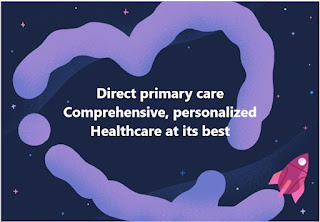Direct Primary Care (DPC) stands as a beacon of hope amidst the complexities of modern healthcare. It presents a compelling alternative to the prevailing fee-for-service model, which burdens doctors with excessive administrative tasks, sapping their time and energy.
 |
| DPC haiku written by Dr. Kim |
In the current system, doctors find themselves entangled in a web of prior authorizations and electronic health record demands, diverting their attention from the patient before them. Simultaneously, American patients grapple with exorbitant healthcare costs, facing bills that defy reason. Even a seemingly routine stitch in the emergency room carries a hefty price tag.
DPC offers a return to simplicity in economics, where the transaction is straightforward: the patient pays the doctor directly for services rendered. This model, akin to a monthly subscription, ensures unfettered access to primary care, regardless of health status or insurance coverage. It breaks free from the convoluted fee structures, granting doctors agency over their practice and allowing them to focus on keeping patients healthy and out of the hospital.
The evolution of the medical profession provides a critical backdrop. Once a diverse field, the landscape shifted dramatically with corporate giants (including payers and big tech companies) acquiring primary-care practices. Private equity firms, too, reshaped hospitals and clinics, exerting influence over the daily practice of more than 70 percent of doctors. This shift, coupled with mounting pressures to generate revenue, has eroded the essence of primary care.
Primary-care physicians play a unique and vital role, necessitating time to understand patients' values and narratives. They confront undifferentiated symptoms, navigating through uncertainties to guide treatment. This trust-based relationship is the bedrock of clinical medicine; yet, it's endangered by shorter visits and an emphasis on productivity metrics.
The financial divide is stark, with primary-care doctors earning considerably less than specialists, particularly those serving Medicare and Medicaid patients. The relentless paperwork further devours precious face-to-face patient time. The toll is real, with an alarming number of physicians battling depression and contemplating leaving the profession altogether.
In contrast, DPC's economic model incentivizes health. With a monthly fee ranging from $50 to $150, DPC doctors can maintain a manageable caseload, ensuring more personalized care. The subscription encompasses a wide range of services, from in-office procedures to negotiated cash prices for labs and imaging, slashing costs compared to insurance-based billing. Furthermore, DPC doctors have the flexibility to dispense medications, providing convenience and cost savings.
DPC democratizes healthcare by bridging crucial gaps in medically underserved populations, including uninsured and underinsured patients. This innovative model exemplifies the innovative spirit of DPC by integrating preventive care and finding creative solutions to serve communities. DPCs offer affordable, accessible, comprehensive, high-quality and patient-centered care.
Critics may raise concerns about scalability, potential patient abandonment, and the challenges of entrepreneurship. Yet, the DPC movement is fueled by a community of impassioned advocates. They endure the intricacies of owning a small business but find empowerment in reclaiming their individuality and values.
The journey of DPC is not without its challenges, as doctors confront the relentless demands of patient care. Yet, they persist, recognizing the profound impact they can have on individual lives. Their stories reveal a profession at a crossroads, where the soul of medicine—delicate and inviolable—finds its refuge in the DPC movement.



